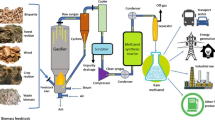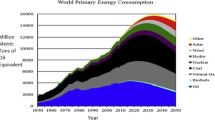Abstract
Justification of using renewable energy sources and a brief analysis of their application prospects is given. The most common renewable energy sources for mobile thermal power plants are presented. The possibilities and ways of using ethanol as an energy source for such plants with diesel engines are analyzed. It is shown that it is feasible to add small amounts of ethanol to oil diesel fuel (DF) for obtaining an environmentally sustainable energy source for diesel engines. Therewith, a stable mixture of components can be obtained by adding anhydrous (absolute) ethanol to the oil fuel. The authors studied a mixture containing 4% (by volume) of absolute ethanol and 96% of oil DF. The physicochemical properties of the mixture and each of its components are presented. Diesel engine of the type D-245.12S has been experimentally studied using the mixture of DF and ethanol. The possibility of reducing the toxicity level of the exhaust emissions when using this mixture as an energy source for diesel engines of mobile power plants is shown. Transition of the studied diesel engine from oil DF to its mixture with ethanol made it possible to reduce the smoke capacity of the exhaust gases by 15–25% and to decrease the specific mass emissions of nitrogen oxides by 17.4%. In this case, we observed a slight increase in the exhaust gas emissions of carbon monoxide and light unburned hydrocarbons, which, however, can easily be eliminated by providing the exhaust system of a diesel engine with a catalytic converter. It is noted that the studied mixture composition should be optimized. The conclusion is made that absolute ethanol is a promising ecofriendly additive to oil diesel fuel and should be used in domestic diesel engines.
Similar content being viewed by others
References
A. A. Aleksandrov, I. A. Arkharov, V. V. Bagrov, A. I. Gaivoronskii, L. V. Grekhov, S. N. Devyanin, N. A. Ivashchenko, and V. A. Markov, Alternative Fuels for Intenal-Combustion Engines, Ed. by A. A. Aleksandrov, and V. A. Markov (Inzhener, Moscow, 2012) [in Russian].
V. E. Fortov and O. S. Popel’, “The current status of the development of renewable energy sources worldwide and in Russia,” Therm. Eng. 61, 389–398 (2014). doi 10.1134/S0040363614060022
O. S. Popel’ and V. E. Fortov, Renewable Energetics in Contemporary World, (Mos. Energ. Inst., Moscow, 2015) [in Russian].
V. N. Baskov and E. S. Pantskhava, “Motor biofuels: The state and prospects of technology development in Russia and in the world,” Therm. Eng. 60, 270–273 (2013). DOI doi 10.1134/S0040363613040024
V. A. Markov, R. M. Bashirov, and I. I. Gabitov, Toxicity of Used Gases of Diesel Engines (Bauman Moscow State Technical Univ., Moscow, 2002) [in Russian].
S. B. Gusakov, Perspectives of Application in Diesel Engines of Renewable Fuels from Renewable Sources (RUDN Univ., Moscow, 2008) [in Russian].
A. A. Aleksandrov and I. A. Arkharov, Motor Fuels: Contemporary Aspects of Safety Storage and Realization in Cities-Megalopolises (Bauman Moscow State Technical Univ., Moscow, 2011) [in Russian].
I. Ahmed, “Oxygenated fuel: Emissions and performance characteristics of ethanol-diesel blends in CI engines,” SAE Tech. Pap. Ser., No. 2475, 1–6 (2001).
K. C. Corkwell and M. M. Jackson, “Lubricity and injector pump wear issues with E diesel fuel blends,” SAE Tech. Pap. Ser., No. 2849, 1–8 (2002).
M. C. Mendoza and P. V. Woon, “E-diesel effects on engine component temperature and heat balance in a cummins C8.3 engine,” SAE Tech. Pap. Ser., No. 2847, 1–7 (2002).
TU 2421-064-07506004-2003: Ethyl Synthetic Dehydrated Refined Alcohol.
Author information
Authors and Affiliations
Corresponding author
Additional information
Original Russian Text © V.A. Markov, V.V. Biryukov, S.I. Kas’kov, 2016, published in Teploenergetika.
Rights and permissions
About this article
Cite this article
Markov, V.A., Biryukov, V.V. & Kas’kov, S.I. Ethanol used as an environmentally sustainable energy resource for thermal power plants. Therm. Eng. 63, 628–635 (2016). https://doi.org/10.1134/S0040601516090044
Published:
Issue Date:
DOI: https://doi.org/10.1134/S0040601516090044




